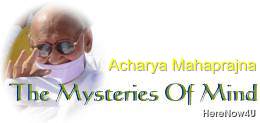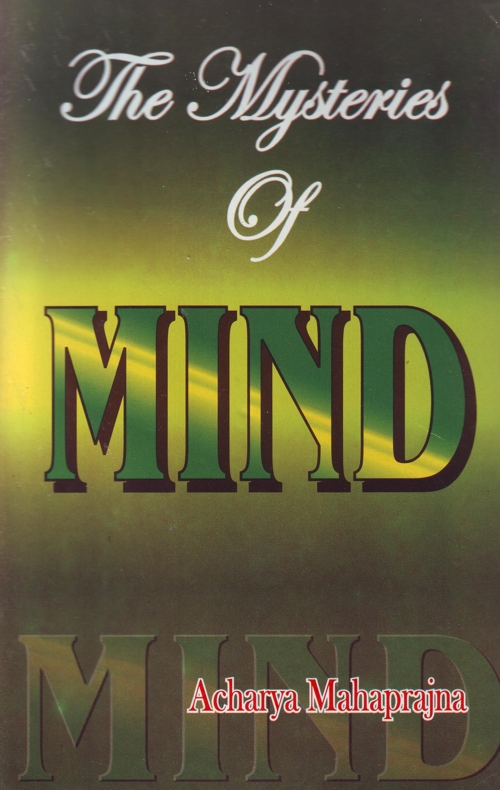
When the battle between Bharata and Bahubali reached a stalemate, the armies stopped fighting: It was decided that Bharata and Bahubali should fight a duel. He who won the duel will be declared the victor. One of the conditions laid down for the battle was that the combatants will not will any other weapon except their eyes. They would go on at each other's eyes without twinkling them. If in the course of this staring, the eyes of any one twinkled, he will be declared vanquished. The practitioner of preksa meditation also uses his eyes as a weapon. Preksa means looking within with wide open and fixed eyes and with an unprejudiced or empty mind.
When we start looking within, we come across anger, pride, deceit, conceit, likes and dislikes, craving for sensual pleasures and mental disorders seething and surging in our hearts. The practitioner has nothing else to do except to watch them, to perceive them. In the course of a prolonged perception, they will disappear by themselves. Perceptive meditation is a great weapon. It is a sharp and deep penetrating weapon. In perceptive meditation we employ will and feeling. We also meditate on lesya or coloration. These devices make the practitioner immune from external influences.
It is said that the future wars will be fought not on the geographical plane but on the psychological plane. There will be no armies. The human mind will be made so powerful that it would cripple and demoralize the enemy situated at a distance of thousands of miles away. Experiments are being done to develop such powers in the mind of man. Both success and failure in these experiments are fraught with grave dangers. The practitioner of sadhana has also to develop his mental powers so that the forces of his enemies may be rendered helpless. His enemies are delusion and ignorance. He will have to employ perception, feeling, word-perception and mental waves and will have to exert himself on all these. And above all, he will have to be self-watchful. The most important thing is the method of sadhana. A correct understanding of the methodology of sadhana will remove all kinds of doubts and misgivings.
There are several instruments for perceiving, grabbing and measuring breath. But one may wonder how far these instruments can enable us to perceive the soul? How can the soul be attained by means of perceiving breath? How can we reclaim the soul by perceiving the dirty body? The practitioner is likely to become confused and ambivalent.
Once a traveller was travelling in a dark night. Somebody had given him a lantern to find his way. The traveller saw that the light of the lantern could illumine a distance of four or five feet only. The distance he had to cover was miles and miles long. He began to wonder how the light of the lantern will be able to guide him through all this distance. The practitioner who has understood the technique of preksa meditation is like the traveller mentioned above. If he has understood the technique of preksa meditation, even a small light can take him to his desired end. If he did not move, the light will illumine only a short area. But if he started walking, the light will travel along with him right up to the end of the journey. A mere theoretical knowledge of the technique will not do. The traveller will have to exert himself in the exercises on meditation.
There is another difficulty. One may ask as to what will the consequence of body perception be. We breathe all the twenty-four hours. What is the sense in perceiving the breathing process? Why should we not try to perceive something new? Why should we not perceive multi-storeyed buildings and roads paved with glass? There is nothing wonderful in the breathing process. Such thoughts distract the mind of the practitioner. He relapses into a state of delusion and forgets that he has to exert himself for self-realization. He will have to divert his mind and re-engage it in the task of self-transformation. It takes time to achieve success. Sometimes the practitioner has to continue exerting himself for the whole of his life, nay even for a number of lives to achieve success.
What the practitioner needs is a change of faith before he begins sadhana. Sraddha means a push, will and determination. Devotional surrender or dedication also plays an important role in it. There can be no success without dedication. There is no place for reasoning in sadhana. Even an insignificant man can become great by the sheer force of dedication and even a great man becomes insignificant if he lacked dedication.
 Acharya Mahaprajna
Acharya Mahaprajna

